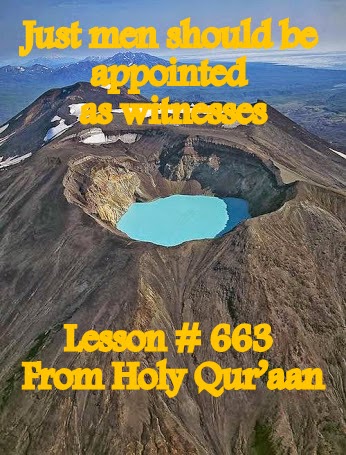Lesson # 663 From Holy Qur’aan
Just men
should be appointed as witnesses
‘Al-Maaa-‘idah (the
Table Spread) – Chapter – 5)–Stage
- 2
Verse
–106 of 120, Section – 14 of 16 (Part - 7)
BisMIllaahir-Rahmaanir-Rahiim
In the name of Allaah,
the Beneficent, the Merciful
|
O ye who believe! Let there be witnesses
between you when death draweth nigh unto one of you, at the time of bequest –
two witnesses, just men from among you, or two of the others not of you, in
case ye are campaigning in the land and the calamity of death befall you. Ye
shall empanel them both after the prayer, and if ye doubt, they shall be made
to swear by Allaah (saying): We will not take a bribe, even though it were
(on behalf of) a near kinsman nor will we hide the testimony of Allaah, for then indeed we should be
of the sinful.
|
Yaaa-‘ayyu-hallaziina ‘aamanuu
shahaadatu baynikum ‘izaa
hazara ‘ahada-kumul-mawtu hiinal-wa-siyyatis-naani zawaa
‘adlim-minkum ‘aw ‘aakha-raani min
gayrikum ‘in ‘antum
Zarabtum fil-‘arzi fa-‘asaa-batkum-musii-batul-mawt. Tah-bisuuna-humaa mim-
ba’-dis-Salaati
fa-yuqsi-maani BIllaahi ‘inir-tabtum laa
nash-tarii bihii samananw-wa
law kaana zaa
qurbaa, wa laa
naktumu shahaada-tAllaahi ‘innaaa
‘izalla-minal-‘aasimiin.
|
Lesson
Method of appointing any person as
executor to carry into effect the will of a testator, who is on the point of
death, is being explained in this verse. The executor is the person whom any
testator gives in charge of his/her property/wealth, so that the executor may
hand over it to the heirs. Appointing two Men as executors, who should be just Muslims,
is better, because nevertheless, a Muslim (Believer) can never be a faithless.
However, if the persons of required standard are not available, then any two common
persons from among the Muslims can be appointed as executors. But if someone is
campaigning in the land and the calamity of death befall him/her, then any
non-Muslim can also be appointed as the executor.
Maximum scholars of the religion
have faith that any non-Muslim can be appointed as executor if the Muslim is
not available. Otherwise, only any Muslim should be appointed as executor. It
has the reason that during the ancient days, only the Muslims were such people
who were considered pure from dishonesty. Unfortunately, now a day, the
Disbelievers and Idolaters are deemed more faithful, honest and just than the
Muslims. The Muslims should take warning from it.
It has been described here that if
the heirs doubt that some part of inheritance of the dead person has been
misappropriated by the executors and they did not hand over the entire heritage
honestly. But the witnesses are not available to prove the misappropriation. In
this condition, an oath would be administered from the executors that they did
not embezzle. And this oath will be taken from them after the prayer. The
commentators of the Holy Word (Quran) has explained that administration of the
oath after the ‘Asr prayer is more
reasonable. Otherwise every oath can be administered after every prayer,
because anyhow, everybody has more fear of God Almighty after the worship than
other times.
It is commanded, “If you have
doubt on the executors that they are dishonest and you have not any witness to
prove their dishonesty, then you should stop the both executors after prayer
and they should swear before all the people upon this matter that they are
honest”, and they should say, “Certainly neither we desire to embezzle any part
of heritage falsely, nor we have any greed of wealth and nor relationship can
stir us up for dishonesty that we cause to give more part of heritage to any
near kinsman”. They should also say, “We swear by Allaah Almighty that we shall neither give any false evidence on
His name, nor putt off His command and nor hide the Truth. If we do so, then
indeed we should be of the sinful”.
Such an incident was happened
during the time of the Messenger of Allaah
Almighty (grace, glory, blessings and peace be upon Him), in which there were
two Christians appointed as the executors. There was a doubt in their honesty.
So an oath was administered from them.



No comments:
Post a Comment